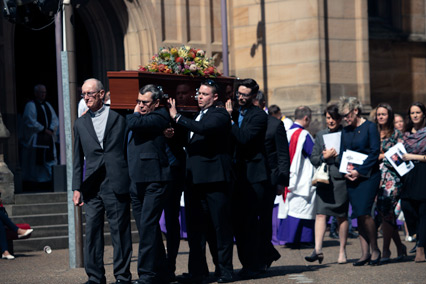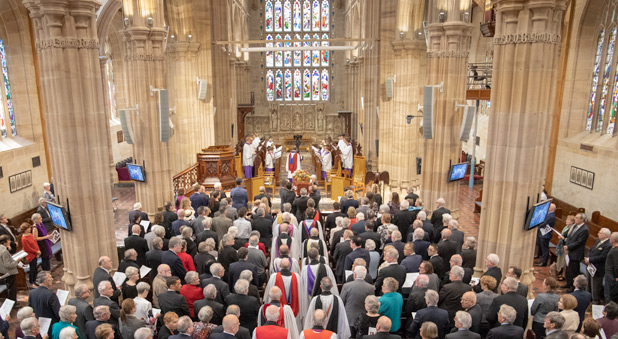The ninth Archbishop of Sydney, Donald William Bradley Robinson, has been laid to rest after a funeral service in St Andrew’s Cathedral which he helped write forty years earlier.
Bishop Robinson died early on Friday morning, 7th September. He was 95.
A renowned New Testament scholar, Bishop Robinson was a lecturer and Vice-Principal at Moore College, before becoming Bishop in Parramatta and later Archbishop of Sydney and Metropolitan of New South Wales from 1982 to 1993.
Don Robinson was a man who truly believed that his God was a God of relationships, and who could happily hold, in tension, a generosity of spirit with intellectual rigour
Among his achievements was the production of An Australian Prayer Book (AAPB), highlighted in the eulogy by his daughter Anne.
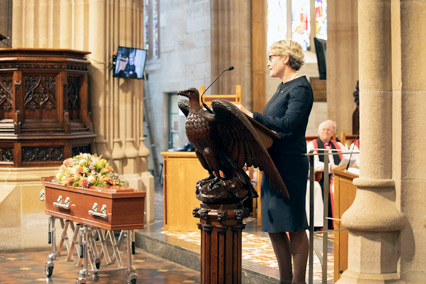
“An Australian Prayer Book was adopted in 1977. What has been called an imperfect unity is very much the work of two men from opposing traditions, Don Robinson and Brother Gilbert Sinden, an Anglo-Catholic from Adelaide. Although we Robinson children like to think we had a big part in its formation as Pa trialled all the collects on us in family prayers” Anne Robinson told the congregation.
“Dad and Brother Gilbert became firm friends, able to reach agreement not compromise. Don Robinson was a man who truly believed that his God was a God of relationships, and who could happily hold, in tension, a generosity of spirit with intellectual rigour. For someone who wasn't particularly sporty, he spent his life playing the ball, not the player.”
Bishop Robinson had been a codebreaker during World War Two, a fact he only revealed in the 1990’s.
Often people might prepare their funeral service beforehand, he'd actually written the text of the liturgy forty years beforehand....
“He described his role as a codebreaker as studying everything about the message without being able to read it. This strong pattern recognition would become critical to his approach to the New Testament,” she said. “What was extraordinary to us as a family was that Pa didn't talk about his war service. Why? Well, he'd signed the Official Secrets Act so he didn't say a word until a book on the codebreakers was published 45 years after the war. He was a man of his word.”
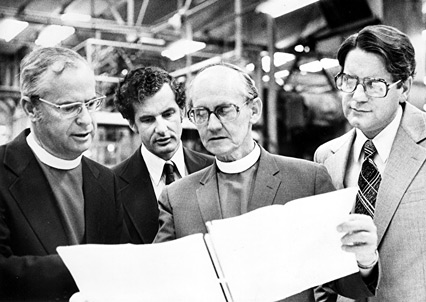
In his sermon, Archbishop Davies who had earlier paid tribute to Bishop Robinson’s contribution as ‘immeasurable’, spoke of his own relationship with his predecessor.
“It was such a pleasure to be with a man who was such a godly Christian man. We think of him as the great New Testament scholar, which he was, he was a man who has so many aspects of him with regard to his writings. He wrote on Church, of course, he wrote on evangelism, he wrote on the gospel, he wrote on history, he wrote on liturgy. AAPB, now 40 years old, we've used his very service. Often people might prepare their funeral service beforehand, he'd actually written the text of the liturgy forty years beforehand….” Dr Davies said.
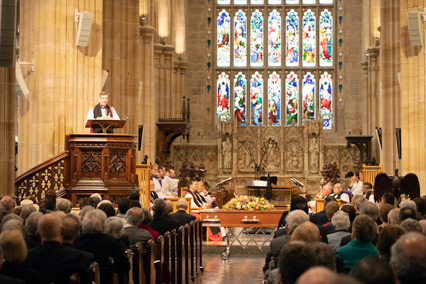
“Don Robinson was indeed a man of his word, as we heard, but he was a man who believed God's word and he was faithful in his proclamation of that word. He would often refer to Psalm 116, verses 12 to 14, the text of the first sermon that Richard Johnson gave on Terra Australis. 'What shall I render unto the Lord for all His benefits towards me. I shall pay Him the vows that I owe Him.' The next verse, I don't know whether Richard Johnson preached on it or not, but it is so appropriate for us today. ‘Blessed in the sight of the Lord is the death of His saints’.
“It is a blessed thing in God’s sight that Donald Robinson is now entered into glory, and all that he taught and all that he believed and all that he said and all that he lived out in his life was looking forward to that great day, when he would see his Saviour face to face.”
